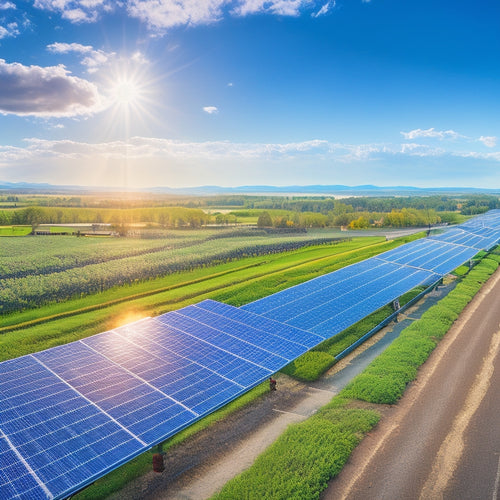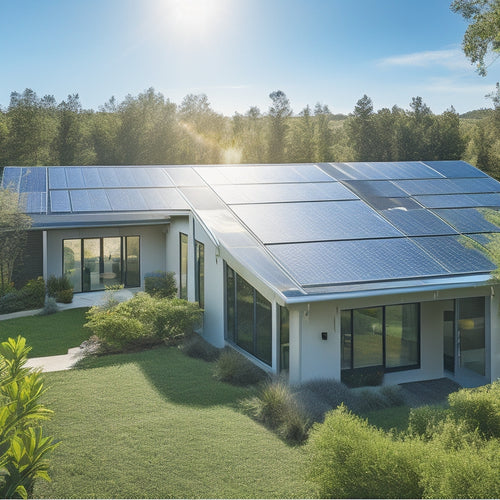
Unlocking Efficient Renewable Energy Solutions
Share
You're on the cusp of revealing efficient renewable energy solutions, where high-performance solar panels with efficiency ratings over 26% and innovative technologies like bifacial cells and perovskite cells can enhance energy output by up to 25%. To maximize your energy output, you'll want to optimize design and installation, considering factors like panel placement, tilt, and orientation. And, with warranties and durability expectations in mind, you can guarantee reliable performance over time. Now, get ready to plunge into the complexities of the renewable energy environment and uncover the innovative solutions that will take your energy independence to the next level.
Overview
- High-efficiency solar cells with ratings over 26% and innovations like bifacial cells can enhance efficiency by up to 25% for maximum investment returns.
- Real-world efficiency performance tests assess renewable energy systems in diverse conditions, ensuring systems operate at peak levels.
- Optimizing design and installation maximizes energy output by minimizing shading, enhancing sunlight exposure, and utilizing energy storage solutions.
- Manufacturer warranties and extended warranty options provide coverage benefits for 10-20 years, protecting against unforeseen repair costs and ensuring peak operational levels.
- Renewable energy solutions reduce greenhouse gas emissions, provide sustainable energy sources, and enhance energy security, making them a vital component of a sustainable future.
Solar Panel Efficiency Ratings
Solar panel efficiency ratings determine how well a solar panel converts sunlight into electrical energy. When you're evaluating solar panels, you need to contemplate the efficiency rating to guarantee you're getting the most out of your investment.
High-efficiency silicon solar cells, for instance, achieve conversion rates over 26% high-efficiency conversion, making them suitable for off-grid systems.
Efficiency measurement techniques, such as the Standard Test Condition (STC) rating, provide a standardized way to compare solar panels.
You'll want to look for solar cell innovations like bifacial cells or perovskite cells, which can enhance efficiency by up to 25%.
Maximizing Energy Output Potential
By optimizing your solar panel system's design and installation, you can release its full energy output potential. This involves strategically placing panels to minimize shading, ensuring ideal tilt and orientation, and selecting high-efficiency modules.
Moreover, technology integration plays an essential role in maximizing energy output. For instance, incorporating energy storage solutions, such as batteries, allows you to store excess energy generated during the day for use during periods of low sunlight or at night. Compatibility between the inverter and battery chemistry is also vital, as it prevents damage and system failure.
Additionally, advanced inverters and monitoring systems enable real-time tracking and optimization of your system's performance. By leveraging these innovations, you can tap into your solar panel system's true potential and enjoy a more reliable, efficient, and sustainable source of energy.
Warranty and Durability Expectations
You expect your renewable energy system to perform consistently over time, even in harsh environmental conditions.
Solar panels, for instance, are designed to withstand temperatures ranging from -40°C to 85°C (-40°F to 185°F) for maximum efficiency environmental stress tests.
As you weigh your options, you'll want to take into account the durability of each component and the warranty options that extend beyond the standard coverage.
Performance Over Time
Nearly every renewable energy solution comes with some form of warranty, assuring a certain level of performance over time. When evaluating a solution, you should consider the warranty's terms and conditions to understand what's covered and for how long.
For instance, LG's 10-year guarantee sets a high standard for battery system warranties. Long-term trends in efficiency degradation can greatly impact the overall performance of your system. You should look for solutions with a proven track record of maintaining efficiency over time.
A reputable manufacturer will provide clear data on expected efficiency degradation rates, allowing you to make an informed decision. By understanding the warranty and expected performance over time, you can ascertain your renewable energy solution meets your needs and provides the freedom from fossil fuels you're looking for.
Durability in Harsh Conditions
Renewable energy solutions must withstand harsh environmental conditions to guarantee uninterrupted performance. You expect your system to operate flawlessly, even in extreme weather.
That's why environmental resilience is essential. Manufacturers must design and test their products to resist corrosion, hail, and other forms of environmental stress. You should look for solutions with a proven track record of durability in harsh conditions.
A durable system assures that you can generate clean energy consistently, reducing your reliance on fossil fuels and enhancing your energy independence.
Extended Warranty Options
A manufacturer's warranty serves as a guarantee of a product's reliability and durability, providing assurance that any defects or malfunctions will be addressed promptly.
When investing in renewable energy solutions, you want to verify your equipment operates at peak levels for an extended period. That's where extended warranty options come in. These options provide you with prolonged coverage benefits, often up to 10-20 years, giving you peace of mind and protection against unforeseen repair costs.
Additionally, warranty transfer options allow you to transfer the warranty to a new owner if you decide to sell or upgrade your system, increasing its resale value.
Comparing Top Solar Panel Brands
When evaluating top solar panel brands, you'll want to scrutinize their panel efficiency ratings, as even a 1% difference can greatly impact energy output over time.
A cost per watt analysis is also essential, as it helps you determine the best value for your investment.
Panel Efficiency Ratings
Compare top solar panel brands and you'll quickly realize that panel efficiency ratings are a critical factor in determining their performance.
You want to maximize energy conversion, and that's where panel technology comes in. Efficiency ratings measure how well a panel converts sunlight into electricity. Look for panels with high efficiencies, typically above 20%.
Leading brands like SunPower, Panasonic, and LG offer high-efficiency panels, often with ratings above 22%.
When evaluating panels, consider the efficiency rating, as it directly impacts the amount of energy you'll generate. Higher efficiencies mean more power per hour of sunlight, giving you more freedom to power your life with clean energy.
Cost per Watt Analysis
Examine the cost per watt analysis of top solar panel brands and you'll uncover a critical aspect of determining their value. This metric reveals the true cost of generating one watt of electricity from each panel.
As you compare top brands, you'll notice varying costs per watt, ranging from $2.50 to $3.50. These differences considerably impact installation costs, with lower-cost panels often requiring more units to generate the same amount of power.
When integrating solar energy into the grid, a lower cost per watt translates to increased efficiency and reduced costs. By considering this metric, you'll make informed decisions about which panels will provide the most freedom from energy costs and environmental impact.
Real-World Efficiency Performance Tests
Embracing the complexities of real-world environments, efficiency performance tests scrutinize renewable energy systems under diverse operational conditions.
You're about to explore the heart of energy conversion, where testing methodologies are put to the test.
In these real-world efficiency performance tests, you'll evaluate how well renewable energy systems perform under varying temperatures, humidity levels, and irradiance conditions.
This rigorous assessment helps you identify areas for improvement, ensuring that your renewable energy systems operate at peak levels.
Certified Efficiency Standards Explained
Beyond the domain of real-world efficiency performance tests, certified efficiency standards serve as the benchmark for evaluating the performance of renewable energy systems.
You're likely wondering how these standards are established and what they entail. Fundamentally, certified efficiency standards are the result of rigorous energy certification processes that involve efficiency testing methods to ascertain renewable energy systems meet specific performance criteria.
These standards are vital in guaranteeing that your renewable energy solutions operate at peak levels, providing you with the freedom to utilize clean energy while minimizing environmental impact.
Frequently Asked Questions
Can I Install Solar Panels on a Metal or Clay Tile Roof?
When installing solar panels, you'll need to take into account roof compatibility; metal tiles are generally suitable, but clay tiles may require additional installation factors, such as specialized flashing or reinforced mounting systems, to guarantee a secure and waterproof fit.
Do Solar Panels Work During Power Outages or Grid Failures?
Imagine being stuck in the dark during Hurricane Maria's 11-month blackout; with solar panels, you'd still have power, but only if you're using off-grid systems with battery storage, allowing you to harvest energy when the grid fails.
How Do I Clean Solar Panels to Maintain Efficiency?
You'll guarantee ideal energy harvesting by adopting regular solar panel maintenance, utilizing cleaning techniques like soft-bristle brushes, distilled water, and mild soap to remove dirt and debris, thereby maximizing your system's efficiency and autonomy.
Are Solar Panels Resistant to Extreme Weather Conditions?
As you leverage the power of the sun, you wonder if your solar panels can weather the storm. Rest assured, modern solar panels boast impressive durability and extreme weather resilience, withstanding fierce winds, hail, and scorching temperatures, ensuring your energy independence.
Can I Use Solar Panels to Charge Electric Vehicles?
You can utilize solar power to charge your electric vehicle, leveraging solar charging and seamless EV integration, allowing you to drive freely, powered by the sun, with a clean conscience and zero emissions.
Ready to Buy
You've got the knowledge to access efficient renewable energy solutions. Now, it's time to put it into action. But, you might be thinking, "Don't solar panels lose efficiency over time?" Actually, top-rated panels retain up to 90% of their efficiency after 25 years. With certified standards and warranty guarantees, you can trust your investment. By choosing the right panel for your needs, you'll maximize energy output and minimize environmental impact. The future of renewable energy starts with you – make it efficient, make it count.
Related Posts
-

Applications of Photovoltaic Systems
Photovoltaic systems are versatile, converting sunlight into electricity for various applications. You can use them i...
-

Smart Grid Technology Implementation Challenges
You'll encounter several challenges when implementing smart grid technology, particularly in cost management, scalabi...
-

Installing Metal Solar Roofs for Maximum Energy Efficiency
Installing metal solar roofs can drastically enhance your home's energy efficiency and durability. These roofs withst...


